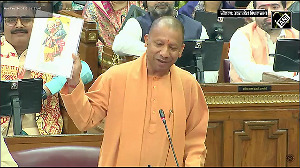Amid an existential crisis facing the firm over Rs 50,000 crore unpaid dues towards the government, billionaire Kumar Mangalam Birla on Wednesday stepped down as the chairman of Vodafone Idea Ltd.

Birla -- who had in June offered to give away his holding in the joint venture with Britain's Vodafone to the government -- will cease to be a director and non-executive chairman of the company at the end of business hours on Wednesday, VIL said in a filing to the stock exchanges.
It did not give any reason for Birla's decision.
He will be replaced by Himanshu Kapania (who was earlier managing director and CEO of Birla's Idea Cellular) as the new chairman of Vodafone Idea Ltd.
The Supreme Court, last month, had rejected petitions by telecom companies including Vodafone Idea and Bharti Airtel, for rectification of alleged errors in calculation of adjusted gross revenue (AGR) related dues payable by them.
The company lawyers had told the apex court that the firm is making a loss and can "go under" if the rectification is not allowed.
According to official data, VIL had an AGR liability of Rs 58,254 crore, out of which it has paid Rs 7,854.37 crore while Rs 50,399.63 crore is outstanding.
In the BSE filing on Wednesday evening, VIL said: "The Board of Directors of Vodafone Idea, at its meeting held today, have accepted the request of Kumar Mangalam Birla to step down as non-executive director and non executive chairman of the board with effect from close of business hours on 4 August, 2021."
Consequently, the board has "unanimously elected" Himanshu Kapania, currently a non-executive director and a nominee of the Aditya Birla Group, as the non-executive chairman.
Kapania is a telecom industry veteran with 25 years of experience, including significant board experience in telecom companies globally.
He has also served on the Global GSMA Board for two years and was chairman of the Cellular Operators Association of India (COAI) for two years.
The move comes just weeks after Birla offered to hand over stake in VIL to the government, in a desperate attempt to keep the company afloat.
The billionaire businessman had made the offer in June in a letter to Cabinet secretary Rajiv Gauba.
In the letter, Birla, who holds around 27 per cent stake in VIL, said investors are not willing to invest in the company in the absence of clarity on AGR liability, adequate moratorium on spectrum payments and most importantly floor pricing regime above the cost of service.
Without immediate active support from the government on the three issues by July, the financial situation of VIL will come to an "irretrievable point of collapse", Birla said in the letter dated June 7.
"It is with a sense of duty towards the 27 crore Indians connected by VIL, I am more than willing to hand over my stake in the company to any entity- public sector/government /domestic financial entity or any other that the government may consider worthy of keeping the company as a going concern," Birla had said in the letter.
In September 2020, VIL had received approval from its board to raise up to Rs 25,000 crore.
However, the company has not been able to raise the funds so far.
According to Birla's letter, VIL has not yet approached any Chinese investors.
Foreign investors, mostly non-Chinese, are hesitating in making investment in the company for understandable reasons, he wrote.
VIL's gross debt, excluding lease liabilities, stood at Rs 1,80,310 crore as of March 31, 2021.
The amount included deferred spectrum payment obligations of Rs 96,270 crore and debt from banks and financial institutions of Rs 23,080 crore, apart from the AGR liability.
Eariler, Vodafone Idea Ltd had also approached the government to seek a one-year moratorium on payment of spectrum instalment of over Rs 8,200 crore, due in April 2022.
VIL, in a letter to the telecom secretary on June 25, 2021, had said it will be "unable to pay the instalment of Rs 8,292 crore due on April 9, 2022" due to "cash being used for payment of AGR (Adjusted Gross Revenue) dues and the inability of the operations to generate the required cash in a predatory pricing situation".
Photograph: Bazuki Muhammad/Reuters












 © 2025
© 2025